人教版(2019)必修 第一册Unit 5 Languages around the world Discovering Useful Struct课件(共42张PPT)
文档属性
| 名称 | 人教版(2019)必修 第一册Unit 5 Languages around the world Discovering Useful Struct课件(共42张PPT) | 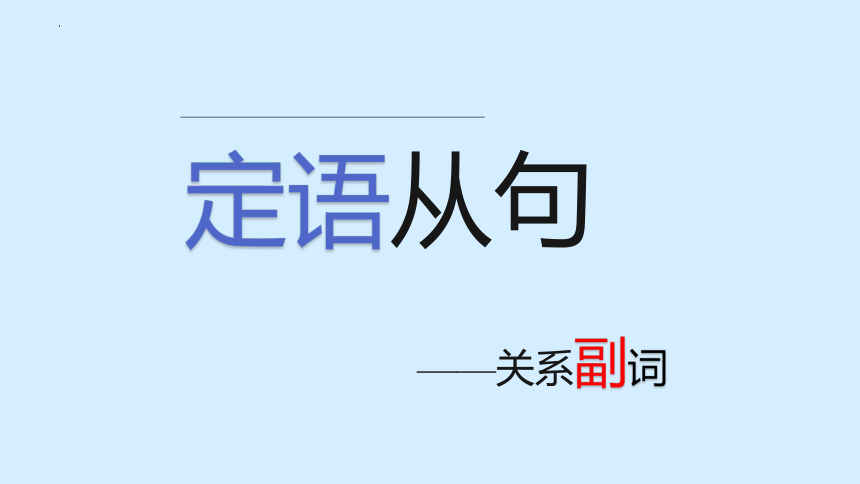 | |
| 格式 | pptx | ||
| 文件大小 | 5.7MB | ||
| 资源类型 | 教案 | ||
| 版本资源 | 人教版(2019) | ||
| 科目 | 英语 | ||
| 更新时间 | 2023-12-13 09:23:06 | ||
图片预览

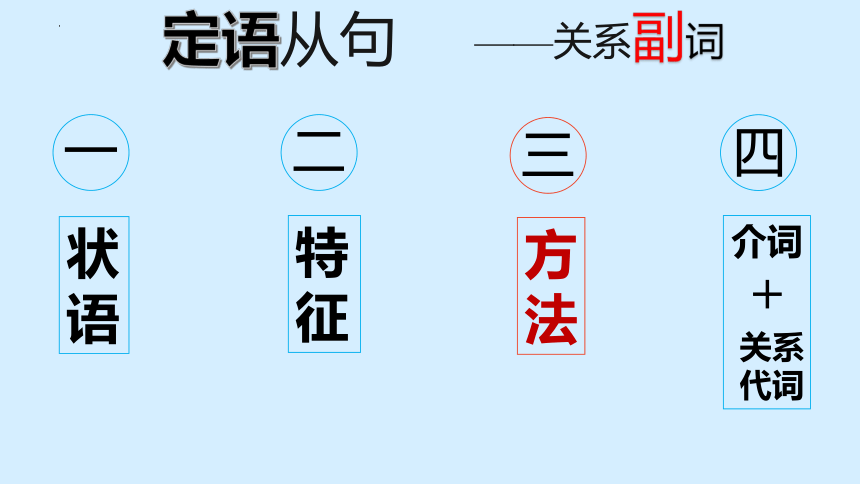
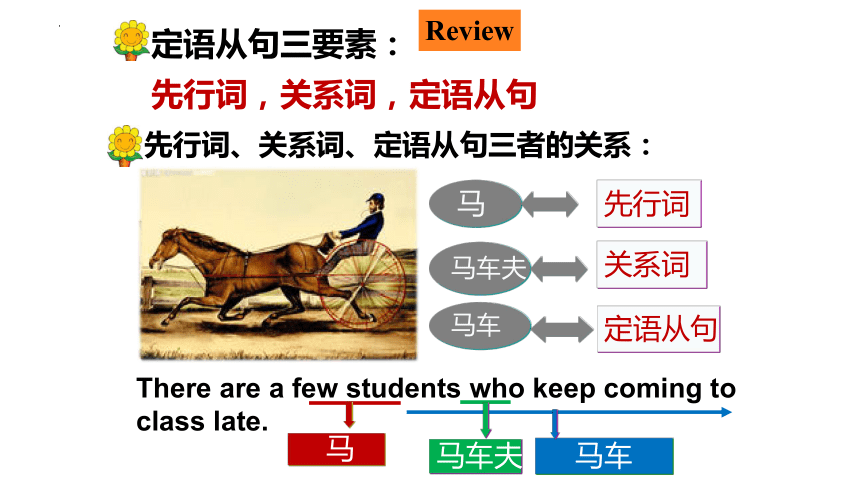
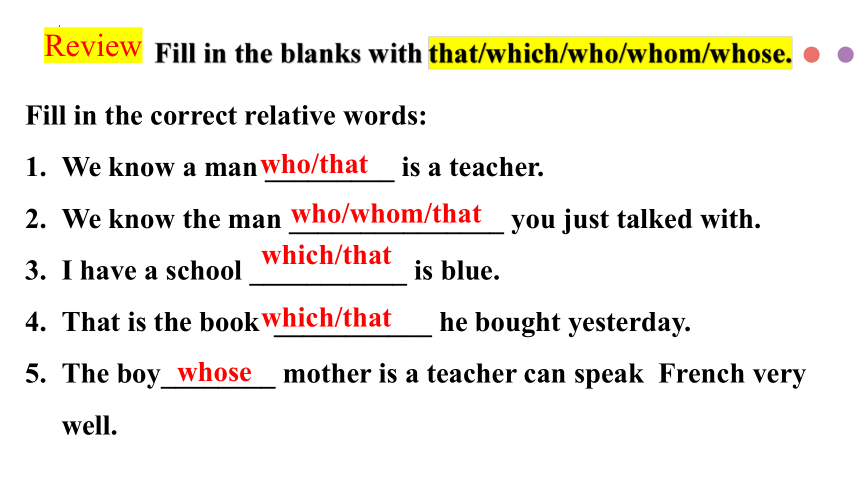
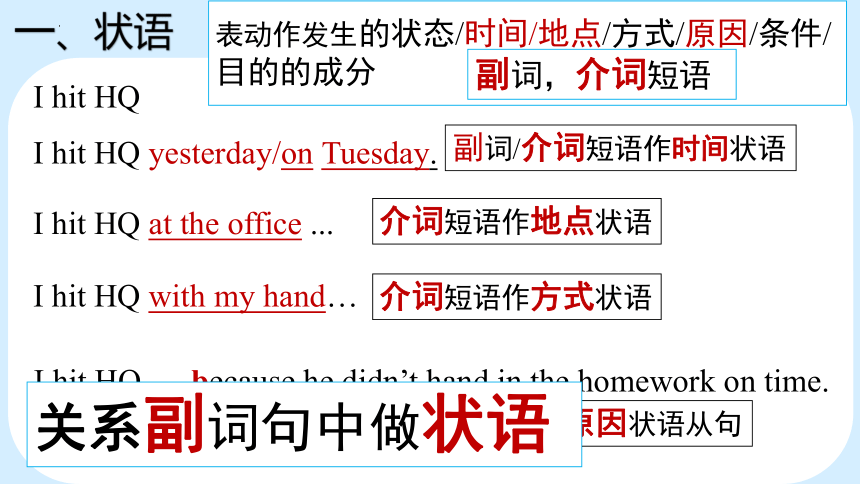
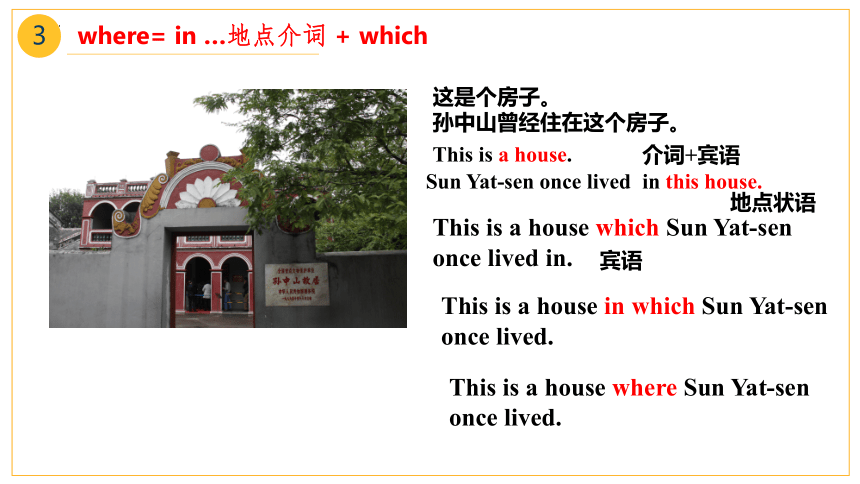
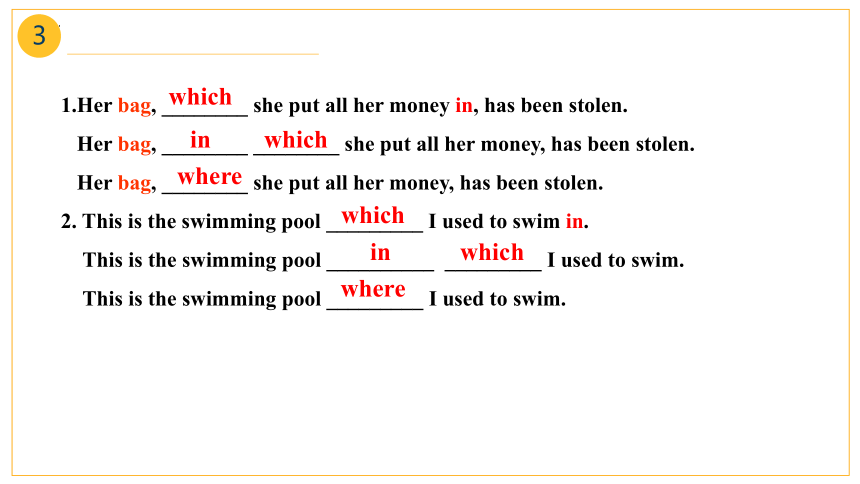
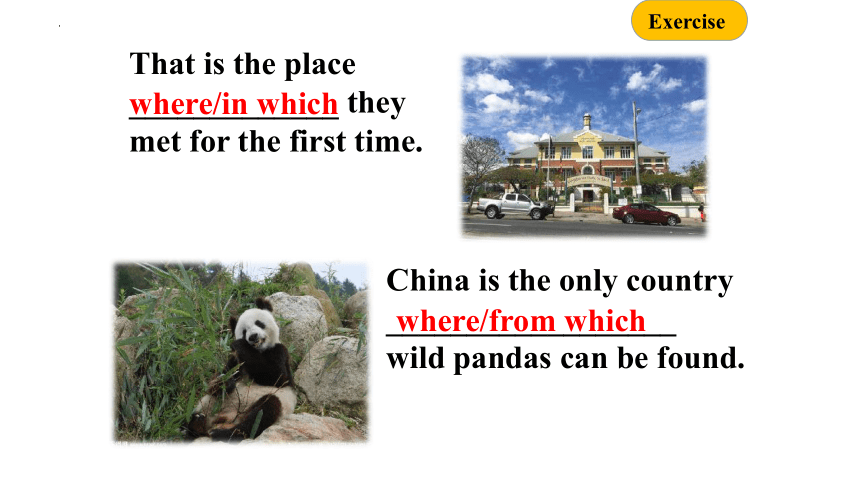
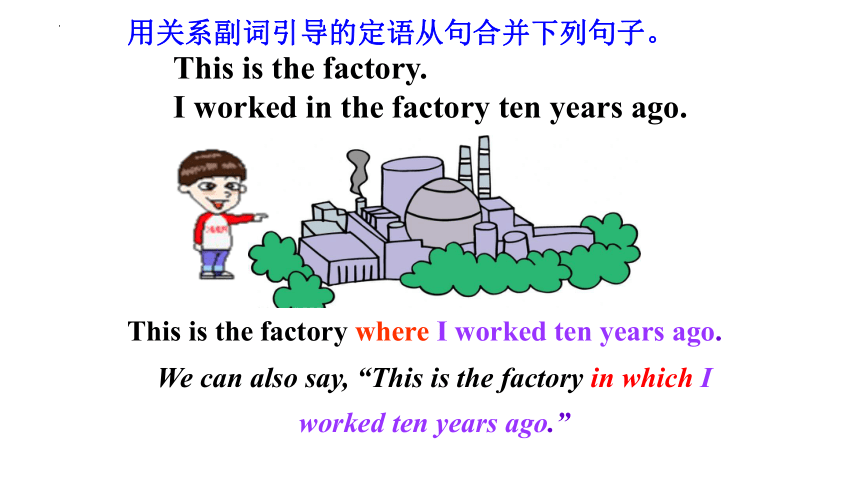
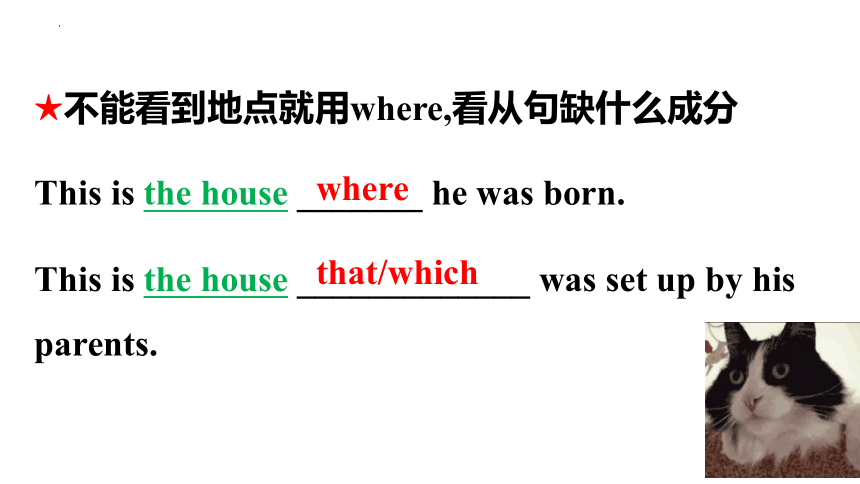
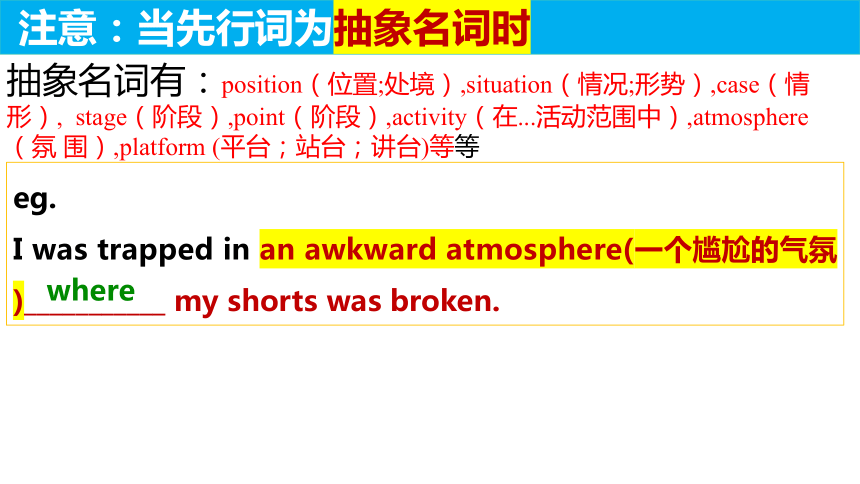
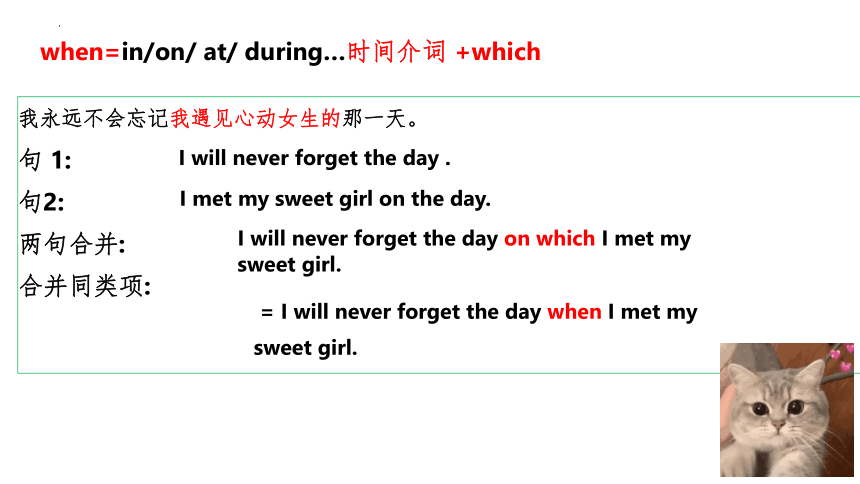
文档简介
(共42张PPT)
定语从句
——关系副词
一
状语
二
特征
四
介词 +
关系代词
三
方法
定语从句
——关系副词
先行词
关系词
定语从句
定语从句三要素:
先行词,关系词,定语从句
There are a few students who keep coming to class late.
马
马车
马车夫
.先行词、关系词、定语从句三者的关系:
马
先行词
马车夫
关系词
马车
定语从句
Review
Fill in the correct relative words:
We know a man _________ is a teacher.
We know the man _______________ you just talked with.
I have a school ___________ is blue.
That is the book ___________ he bought yesterday.
The boy________ mother is a teacher can speak French very well.
who/that
which/that
which/that
who/whom/that
whose
Fill in the blanks with that/which/who/whom/whose.
Review
一、状语
I hit HQ
表动作发生的状态/时间/地点/方式/原因/条件/目的的成分
副词,介词短语
I hit HQ yesterday/on Tuesday.
I hit HQ at the office ...
I hit HQ with my hand…
I hit HQ…, because he didn’t hand in the homework on time.
副词/介词短语作时间状语
介词短语作地点状语
介词短语作方式状语
because引导原因状语从句
关系副词句中做状语
关系副词——作状语
3
Sun Yat-sen once lived iin this house.
孙中山曾经住在这个房子。
这是个房子。
This is a house.
This is a house which Sun Yat-sen once lived in.
This is a house in which Sun Yat-sen once lived.
This is a house where Sun Yat-sen once lived.
宾语
介词+宾语
地点状语
where= in …地点介词 + which
关系副词——作状语
3
1.Her bag, ________ she put all her money in, has been stolen.
Her bag, ________ ________ she put all her money, has been stolen.
Her bag, ________ she put all her money, has been stolen.
2. This is the swimming pool _________ I used to swim in.
This is the swimming pool __________ _________ I used to swim.
This is the swimming pool _________ I used to swim.
which
which
which
which
in
in
where
where
That is the place _____________ they met for the first time.
where/in which
China is the only country
__________________
wild pandas can be found.
where/from which
Exercise
This is the factory.
I worked in the factory ten years ago.
用关系副词引导的定语从句合并下列句子。
This is the factory where I worked ten years ago.
We can also say, “This is the factory in which I worked ten years ago.”
★不能看到地点就用where,看从句缺什么成分
This is the house _______ he was born.
This is the house _____________ was set up by his parents.
where
that/which
eg.
I was trapped in an awkward atmosphere(一个尴尬的气氛)___________ my shorts was broken.
注意:当先行词为抽象名词时
where
抽象名词有:position(位置;处境),situation(情况;形势),case(情形), stage(阶段),point(阶段),activity(在...活动范围中),atmosphere(氛 围),platform (平台;站台;讲台)等等
我永远不会忘记我遇见心动女生的那一天。
句 1:
句2:
两句合并:
合并同类项:
I will never forget the day .
I met my sweet girl on the day.
I will never forget the day on which I met my sweet girl.
= I will never forget the day when I met my sweet girl.
when=in/on/ at/ during…时间介词 +which
I'll never forget the day ______________ I first went to school.
when /on which
There was a time _________________ he danced to the Little Apple everyday.
when/during which
。
Exercise
They’ll never forget July 1.
Hong Kong returned to its motherland on July 1.
They’ll never forget July 1 when Hong Kong returned to its motherland.
They’ll never forget July 1 on which Hong Kong
returned to its motherland.
when引导的定语从句修饰表示时间的名词
time, hour, day, year, moment, occasion 时刻,age年代,period阶段, stage时期,interval 间隙等词
并在定语从句中作时间状语,相当于介词
(in/on/during)+which
I’ll never forget the moment in which(when) I studied in the classroom.
★不能看到时间就用when看从句缺什么成分
I’ll never forget the day ______ I lived in the mountains.
I’ll never forget the day _______________ I spent in the mountains.
when
that/which/省略
我知道他迟到的原因。
句 1:
句2:
两句合并:
合并同类项:
I know the reason.
For some reason, he came late.
I know the reason for which he came late.
= I know the reason why he came late.
why=for which
You did a lot for me, for which I was grateful.
I don’t know the reason ________________
________________________
我不知道她为什么如此迷恋鹿晗。
why / for which she is so crazy about Lu Han.
Exercise
★不能看到reason, 就用why.看从句缺什么成分
This is the reason _____ he was late.
This is the reason ____________he told us for his being late.
why
that/which
四、方法
1.找先行词(重复词)
2.先行词带入从句
3.填关系词
主/宾(表) 关系代词
人who, whom物which
that whose
1.找 2.带(成 意) 3.填
状语/非主宾表/有介词句子才完整 关系副词
①成分
②意义
时间 when
地点where原因 why
四、方法
主/宾(表) 代
who/whom/which/that/whose
1.找 2.带(成 意) 3.填
状语/非主宾表/有介词完整 副
when/where/why
I still remember the day _______ I first went to the Great Wall.
Do you remember the days _______ we spent together
when
_that/which
四、方法
主/宾(表) 代
who/whom/which/that/whose
1.找 2.带(成 意) 3.填
状语/非主宾表/有介词完整 副
when/where/why
This is the house I used to live.
This is the house I built last year.
where
that/which
四、方法
主/宾(表) 代
who/whom/which/that/whose
1.找 2.带(成 意) 3.填
状语/非主宾表/有介词完整 副
when/where/why
I don't know the reason he didn't turn to his friend for help yesterday.
I won't listen to the reason you have given us.
why
that /which
用适当的关系词填空(一个)。
1. Do you still remember the first day ______ you went to
high school
2. I paid a visit to Fudan University _______ my father
studied thirty years ago.
3. Do you know the real reason ______ Anne didn't go to
the get-together
4. Tomorrow I will bring here the magazine for _______
you asked.
5. Peter put himself in a situation _______ he had to leave
the company.
6. There was a time ______ my daughter was crazy about
pop music.
7. The restaurant _______ I have eaten a wonderful meal
is going to close down.
8. There are two main reasons ______ this situation has
been allowed to continue.
when
where
why
which
where
when
where
why
1.关系代词的确定
一、“介词 + 关系代词”引导的定语从句
当先行词是人时,用介词 + whom 引导定语从句,例如:
Do you know the girl with ________ our teacher is talking
当先行词是物时,用介词 + which引导定语从句,例如:
This is the room in ___________ my grandmother used to live.
whom
which
Restrictive relative clauses
介词+人whom/物which/whose
介词后 ×that/who
1、介词选择的三原则:一先二动三意义。
一先:根据先行词的搭配习惯来确定。
二动:根据从句中谓语动词的搭配习惯来确定。
三意义:根据从句所表达的意义来确定。
2. 介词的确定
根据先行词的搭配关系:
1) I still remember the day _______ _______ I met TFboys.
2) I will never forget the farm _______ ______ I worked with you.
3) The money _______ _______ you were to buy food is gone.
on which
on which
Restrictive relative clauses
with which
(on the day 在那天)
(on the farm 在农场)
(with the money 用钱)
一、“介词 + 关系代词”引导的定语从句
一先二动三意义
2. 介词的确定
根据谓语动词或形容词的搭配习惯
Do you like the book _______ _______ she spent $10
2) Do you like the book _______ _______ she paid $10
3) The West Lake, _______ _______ Hangzhou is famous, is a beautiful place.
on which
for which
Restrictive relative clauses
for which
一、“介词 + 关系代词”引导的定语从句
spent 10 on
pay for
be famous for
一先二动三意义
2. 介词的确定
根据句子的意思来确定
1) Air, _______ which man can’t live, is really important. 空气非常重要,没有了它人类便不能生存。
2) This is the man _______ whom my brother has worked for ten years. 这就是和我弟弟一起工作了十年的那个人。
without
with
Restrictive relative clauses
一、“介词 + 关系代词”引导的定语从句
一先二动三意义
2. 介词的确定:名词,不定代词或数词 + of + which (指物)/whom (指人)
表示“所有”或“整体的一部分”时通常用介词 “of”
1) He has two sons, _____________ graduated from Peking University. 他有两个儿子,他们都毕业于北京大学。
2) Tom wrote many children’s books, nearly half __________ were about campus culture. 汤姆写了很多儿童书籍,其中将近一半是关于校园文化的。
both of whom
of which
Restrictive relative clauses
一、“介词 + 关系代词”引导的定语从句
一先二动三意义
用介词 + 关系代词填空。
1. Who is the person _______ _______ you just shook hands
2. China is a powerful country, _______ _______ we are proud.
3. This is the tree _______ _______ we used to play games.
4. This is my glasses, _______ _______ I can’t see clearly.
5. Do you remember the day _______ _______ you joined our club
6. Do you know the reason _____ _______ he lost the job
即学即练
with whom
without which
under which
of which
on which
for which
1. This is the rock ___________ the boy fell down into the sea.
2. The film star ___________ we talked a lot yesterday will give us a speech tomorrow.
3. The West Lake _________ Hangzhou is famous in the world will be more beautiful.
4. The subject ________ Xiao Wang is good is physics.
from which
about whom
for which
at which
Exercise:介词+关系代词
4
The book _____ ______ I heard was written twenty years ago.
The people ____ ____ the man spoke weren’t listening.
The pen _____ _____ she wrote that book can now be seen in a museum.
The little creature ____ ____ scientists are interested is known as ET.
about
to
which
in
which
一先二动三意义
whom
with
which
5. 分割/分裂式定从
一般情况定语从句紧跟在先行词之后,但在具体应用中,往往也出现定语从句与先行词被分隔的现象。即定语从句被其他成份隔开,没有直接位于被修饰的中心词即先行词之后,这种现象被称为分隔现象,这种从句叫做分隔式定语从句。
有时是为了行文的需要,为了使句子结构保持平衡;有的是出于修辞上的需要,以避免那种千篇一律的语言模式。解此类题,要找准先行词,忽略掉插入语,就变得简单了。
1. (天津,10) The days are gone________ physical strength was all you needed to make a living.
when
2. (陕西) I walked up to the top of the hill with my fiend, ________we enjoyed a splendid view of the lake.
where
why表示原因或理由,在限制性定语从句中作原因状语,它的先行词一般只有reason,相当于"介词 for + which "。
There’s no reason for which/ why we can betray(背叛)our friends.
先行词是reason,关系词在从句中作原因状语,应用关系副词why引导。We can betray our friends for no reason.( for no reason)
1.there was a time when......曾经有一段……的时光/曾经一度……
Eg: There was a time when women had no right to participate in
the Olympics.
2....the reason why(定从作状语)...is/was that(表从).........的理由是因为.....
Eg: The reason why he was absent from the meeting was that he
was ill.
3.It is/ was + 被强调部分(定从)+that/who+ 其他 正是...的......
Eg: It is your efforts that you have made that greatly inspire us.
评
定语从句常见句式
关系词 先行词所指 关系词在句中作用
关系代词 that 人/物 主语,宾语,表语
which 物 主语,宾语
who 人 主语,宾语(无介词)
whom 人 宾语
whose 人/物 定语 ...的
关系副词 When=介词+which 时间 时间状语
Where=介词+which 地点 地点状语
Why=for+which reason 原因状语
检
1.归纳整理本课内容,反刍内化。(2min)
I 单句语法填空 (课时评价作业43页)
1 That is the age_____________ people live in peace and happiness .
2.This is the place________________ we met yesterday .
3 He will remember the factory ____________he worked ten years ago .
4-This is the reason______________ he was late for school .
5 He will remember the day____________ he spent together with us .
6 Do you know the year _____________the Chinese Communist Party was founded
7The place __________ interested me most was the Children ’ s Palace .
8 I shall never forget those years ______________ I lived on the farm with the farmers ,__________ has a great effect on my life .
when/in which
where/in which
where/in which
why/for which
that/ which/-
when/in which
that/ which
when/in which
which
that VS. which
that用法真有趣,逗介之后不考虑;
只用that要牢记:先行若是不定代;
先行词前序数词;先行词前最高级;
just , the only/ very / same / last,
其后也要用that。
展
1)关系副词when
①There was a period(时期)________ I hated to go to school.
②Last winter________ I went there again, they had a big separate
house to raise dozens of chickens.
③I will never forget the year_______we were immersed in learning
European languages.
2)关系副词where
①He gets into a situation_______ it is hard to decide what is right or wrong.
②The factory_______ his father works is in the west of the city.
③Creating a relaxing atmosphere_______employees are less scared
to state their views is a big challenge.
3)关系副词why
①He didn’t tell me the reason_______he was so upset.
②Please tell me the reason ________ he refused to follow my advice.
基础感知2
when
when
when
where
where
where
why
why
during which
in which
in which
in which
in which
in which
for which
for which
展
3.“介词+which/whom”的用法
①I’ll never forget the days______________we studied together.
②This is the town________Shakespeare was born.
③There’s no reason________we shouldn’t be friends.
④After graduation she reached a point in her life________she had to
decide what to do.
⑤This is a subject____________we might argue for a long while.
⑥The colorless gas____________we cannot live is called oxygen(氧气).
⑦This is the camera________ he often takes photos.
⑧We’ll go to meet the famous singer____________we often talk.
⑨The main reason__________he lost his job was that he often drank.
⑩The lady__________I discussed different world languages stays in
my memory as a good friend.
基础感知3
on/during which
in which
for which
at which
about which
without which
with which
about whom
for which
with whom
when
where
why
where
why
基础感知4
①There are places______ancient languages were born and reasons______languages
evolved uniquely due to isolation.
②The reason ______ I love my job as a nature photographer is ______ I can observe
animals in their natural environment.
③Our teacher took us to the museum ______ an exhibition on Chinese art was held.
④It was in September, 2013 _____ I studied in the UK _____ I met and fell in love
with my wife.
⑤Do you know the year______the Chinese Communist Party(中国共产党) was
founded
⑥However, the typical teenagers’ lifestyle is already filled with so much competition
______ it would be wise to plan activities______ ______there are more winners
than losers.
展
where/in which
for which/why
for which/why
that
in which/ where
when
that
when/in which
in which
that
定语从句
——关系副词
一
状语
二
特征
四
介词 +
关系代词
三
方法
定语从句
——关系副词
先行词
关系词
定语从句
定语从句三要素:
先行词,关系词,定语从句
There are a few students who keep coming to class late.
马
马车
马车夫
.先行词、关系词、定语从句三者的关系:
马
先行词
马车夫
关系词
马车
定语从句
Review
Fill in the correct relative words:
We know a man _________ is a teacher.
We know the man _______________ you just talked with.
I have a school ___________ is blue.
That is the book ___________ he bought yesterday.
The boy________ mother is a teacher can speak French very well.
who/that
which/that
which/that
who/whom/that
whose
Fill in the blanks with that/which/who/whom/whose.
Review
一、状语
I hit HQ
表动作发生的状态/时间/地点/方式/原因/条件/目的的成分
副词,介词短语
I hit HQ yesterday/on Tuesday.
I hit HQ at the office ...
I hit HQ with my hand…
I hit HQ…, because he didn’t hand in the homework on time.
副词/介词短语作时间状语
介词短语作地点状语
介词短语作方式状语
because引导原因状语从句
关系副词句中做状语
关系副词——作状语
3
Sun Yat-sen once lived iin this house.
孙中山曾经住在这个房子。
这是个房子。
This is a house.
This is a house which Sun Yat-sen once lived in.
This is a house in which Sun Yat-sen once lived.
This is a house where Sun Yat-sen once lived.
宾语
介词+宾语
地点状语
where= in …地点介词 + which
关系副词——作状语
3
1.Her bag, ________ she put all her money in, has been stolen.
Her bag, ________ ________ she put all her money, has been stolen.
Her bag, ________ she put all her money, has been stolen.
2. This is the swimming pool _________ I used to swim in.
This is the swimming pool __________ _________ I used to swim.
This is the swimming pool _________ I used to swim.
which
which
which
which
in
in
where
where
That is the place _____________ they met for the first time.
where/in which
China is the only country
__________________
wild pandas can be found.
where/from which
Exercise
This is the factory.
I worked in the factory ten years ago.
用关系副词引导的定语从句合并下列句子。
This is the factory where I worked ten years ago.
We can also say, “This is the factory in which I worked ten years ago.”
★不能看到地点就用where,看从句缺什么成分
This is the house _______ he was born.
This is the house _____________ was set up by his parents.
where
that/which
eg.
I was trapped in an awkward atmosphere(一个尴尬的气氛)___________ my shorts was broken.
注意:当先行词为抽象名词时
where
抽象名词有:position(位置;处境),situation(情况;形势),case(情形), stage(阶段),point(阶段),activity(在...活动范围中),atmosphere(氛 围),platform (平台;站台;讲台)等等
我永远不会忘记我遇见心动女生的那一天。
句 1:
句2:
两句合并:
合并同类项:
I will never forget the day .
I met my sweet girl on the day.
I will never forget the day on which I met my sweet girl.
= I will never forget the day when I met my sweet girl.
when=in/on/ at/ during…时间介词 +which
I'll never forget the day ______________ I first went to school.
when /on which
There was a time _________________ he danced to the Little Apple everyday.
when/during which
。
Exercise
They’ll never forget July 1.
Hong Kong returned to its motherland on July 1.
They’ll never forget July 1 when Hong Kong returned to its motherland.
They’ll never forget July 1 on which Hong Kong
returned to its motherland.
when引导的定语从句修饰表示时间的名词
time, hour, day, year, moment, occasion 时刻,age年代,period阶段, stage时期,interval 间隙等词
并在定语从句中作时间状语,相当于介词
(in/on/during)+which
I’ll never forget the moment in which(when) I studied in the classroom.
★不能看到时间就用when看从句缺什么成分
I’ll never forget the day ______ I lived in the mountains.
I’ll never forget the day _______________ I spent in the mountains.
when
that/which/省略
我知道他迟到的原因。
句 1:
句2:
两句合并:
合并同类项:
I know the reason.
For some reason, he came late.
I know the reason for which he came late.
= I know the reason why he came late.
why=for which
You did a lot for me, for which I was grateful.
I don’t know the reason ________________
________________________
我不知道她为什么如此迷恋鹿晗。
why / for which she is so crazy about Lu Han.
Exercise
★不能看到reason, 就用why.看从句缺什么成分
This is the reason _____ he was late.
This is the reason ____________he told us for his being late.
why
that/which
四、方法
1.找先行词(重复词)
2.先行词带入从句
3.填关系词
主/宾(表) 关系代词
人who, whom物which
that whose
1.找 2.带(成 意) 3.填
状语/非主宾表/有介词句子才完整 关系副词
①成分
②意义
时间 when
地点where原因 why
四、方法
主/宾(表) 代
who/whom/which/that/whose
1.找 2.带(成 意) 3.填
状语/非主宾表/有介词完整 副
when/where/why
I still remember the day _______ I first went to the Great Wall.
Do you remember the days _______ we spent together
when
_that/which
四、方法
主/宾(表) 代
who/whom/which/that/whose
1.找 2.带(成 意) 3.填
状语/非主宾表/有介词完整 副
when/where/why
This is the house I used to live.
This is the house I built last year.
where
that/which
四、方法
主/宾(表) 代
who/whom/which/that/whose
1.找 2.带(成 意) 3.填
状语/非主宾表/有介词完整 副
when/where/why
I don't know the reason he didn't turn to his friend for help yesterday.
I won't listen to the reason you have given us.
why
that /which
用适当的关系词填空(一个)。
1. Do you still remember the first day ______ you went to
high school
2. I paid a visit to Fudan University _______ my father
studied thirty years ago.
3. Do you know the real reason ______ Anne didn't go to
the get-together
4. Tomorrow I will bring here the magazine for _______
you asked.
5. Peter put himself in a situation _______ he had to leave
the company.
6. There was a time ______ my daughter was crazy about
pop music.
7. The restaurant _______ I have eaten a wonderful meal
is going to close down.
8. There are two main reasons ______ this situation has
been allowed to continue.
when
where
why
which
where
when
where
why
1.关系代词的确定
一、“介词 + 关系代词”引导的定语从句
当先行词是人时,用介词 + whom 引导定语从句,例如:
Do you know the girl with ________ our teacher is talking
当先行词是物时,用介词 + which引导定语从句,例如:
This is the room in ___________ my grandmother used to live.
whom
which
Restrictive relative clauses
介词+人whom/物which/whose
介词后 ×that/who
1、介词选择的三原则:一先二动三意义。
一先:根据先行词的搭配习惯来确定。
二动:根据从句中谓语动词的搭配习惯来确定。
三意义:根据从句所表达的意义来确定。
2. 介词的确定
根据先行词的搭配关系:
1) I still remember the day _______ _______ I met TFboys.
2) I will never forget the farm _______ ______ I worked with you.
3) The money _______ _______ you were to buy food is gone.
on which
on which
Restrictive relative clauses
with which
(on the day 在那天)
(on the farm 在农场)
(with the money 用钱)
一、“介词 + 关系代词”引导的定语从句
一先二动三意义
2. 介词的确定
根据谓语动词或形容词的搭配习惯
Do you like the book _______ _______ she spent $10
2) Do you like the book _______ _______ she paid $10
3) The West Lake, _______ _______ Hangzhou is famous, is a beautiful place.
on which
for which
Restrictive relative clauses
for which
一、“介词 + 关系代词”引导的定语从句
spent 10 on
pay for
be famous for
一先二动三意义
2. 介词的确定
根据句子的意思来确定
1) Air, _______ which man can’t live, is really important. 空气非常重要,没有了它人类便不能生存。
2) This is the man _______ whom my brother has worked for ten years. 这就是和我弟弟一起工作了十年的那个人。
without
with
Restrictive relative clauses
一、“介词 + 关系代词”引导的定语从句
一先二动三意义
2. 介词的确定:名词,不定代词或数词 + of + which (指物)/whom (指人)
表示“所有”或“整体的一部分”时通常用介词 “of”
1) He has two sons, _____________ graduated from Peking University. 他有两个儿子,他们都毕业于北京大学。
2) Tom wrote many children’s books, nearly half __________ were about campus culture. 汤姆写了很多儿童书籍,其中将近一半是关于校园文化的。
both of whom
of which
Restrictive relative clauses
一、“介词 + 关系代词”引导的定语从句
一先二动三意义
用介词 + 关系代词填空。
1. Who is the person _______ _______ you just shook hands
2. China is a powerful country, _______ _______ we are proud.
3. This is the tree _______ _______ we used to play games.
4. This is my glasses, _______ _______ I can’t see clearly.
5. Do you remember the day _______ _______ you joined our club
6. Do you know the reason _____ _______ he lost the job
即学即练
with whom
without which
under which
of which
on which
for which
1. This is the rock ___________ the boy fell down into the sea.
2. The film star ___________ we talked a lot yesterday will give us a speech tomorrow.
3. The West Lake _________ Hangzhou is famous in the world will be more beautiful.
4. The subject ________ Xiao Wang is good is physics.
from which
about whom
for which
at which
Exercise:介词+关系代词
4
The book _____ ______ I heard was written twenty years ago.
The people ____ ____ the man spoke weren’t listening.
The pen _____ _____ she wrote that book can now be seen in a museum.
The little creature ____ ____ scientists are interested is known as ET.
about
to
which
in
which
一先二动三意义
whom
with
which
5. 分割/分裂式定从
一般情况定语从句紧跟在先行词之后,但在具体应用中,往往也出现定语从句与先行词被分隔的现象。即定语从句被其他成份隔开,没有直接位于被修饰的中心词即先行词之后,这种现象被称为分隔现象,这种从句叫做分隔式定语从句。
有时是为了行文的需要,为了使句子结构保持平衡;有的是出于修辞上的需要,以避免那种千篇一律的语言模式。解此类题,要找准先行词,忽略掉插入语,就变得简单了。
1. (天津,10) The days are gone________ physical strength was all you needed to make a living.
when
2. (陕西) I walked up to the top of the hill with my fiend, ________we enjoyed a splendid view of the lake.
where
why表示原因或理由,在限制性定语从句中作原因状语,它的先行词一般只有reason,相当于"介词 for + which "。
There’s no reason for which/ why we can betray(背叛)our friends.
先行词是reason,关系词在从句中作原因状语,应用关系副词why引导。We can betray our friends for no reason.( for no reason)
1.there was a time when......曾经有一段……的时光/曾经一度……
Eg: There was a time when women had no right to participate in
the Olympics.
2....the reason why(定从作状语)...is/was that(表从).........的理由是因为.....
Eg: The reason why he was absent from the meeting was that he
was ill.
3.It is/ was + 被强调部分(定从)+that/who+ 其他 正是...的......
Eg: It is your efforts that you have made that greatly inspire us.
评
定语从句常见句式
关系词 先行词所指 关系词在句中作用
关系代词 that 人/物 主语,宾语,表语
which 物 主语,宾语
who 人 主语,宾语(无介词)
whom 人 宾语
whose 人/物 定语 ...的
关系副词 When=介词+which 时间 时间状语
Where=介词+which 地点 地点状语
Why=for+which reason 原因状语
检
1.归纳整理本课内容,反刍内化。(2min)
I 单句语法填空 (课时评价作业43页)
1 That is the age_____________ people live in peace and happiness .
2.This is the place________________ we met yesterday .
3 He will remember the factory ____________he worked ten years ago .
4-This is the reason______________ he was late for school .
5 He will remember the day____________ he spent together with us .
6 Do you know the year _____________the Chinese Communist Party was founded
7The place __________ interested me most was the Children ’ s Palace .
8 I shall never forget those years ______________ I lived on the farm with the farmers ,__________ has a great effect on my life .
when/in which
where/in which
where/in which
why/for which
that/ which/-
when/in which
that/ which
when/in which
which
that VS. which
that用法真有趣,逗介之后不考虑;
只用that要牢记:先行若是不定代;
先行词前序数词;先行词前最高级;
just , the only/ very / same / last,
其后也要用that。
展
1)关系副词when
①There was a period(时期)________ I hated to go to school.
②Last winter________ I went there again, they had a big separate
house to raise dozens of chickens.
③I will never forget the year_______we were immersed in learning
European languages.
2)关系副词where
①He gets into a situation_______ it is hard to decide what is right or wrong.
②The factory_______ his father works is in the west of the city.
③Creating a relaxing atmosphere_______employees are less scared
to state their views is a big challenge.
3)关系副词why
①He didn’t tell me the reason_______he was so upset.
②Please tell me the reason ________ he refused to follow my advice.
基础感知2
when
when
when
where
where
where
why
why
during which
in which
in which
in which
in which
in which
for which
for which
展
3.“介词+which/whom”的用法
①I’ll never forget the days______________we studied together.
②This is the town________Shakespeare was born.
③There’s no reason________we shouldn’t be friends.
④After graduation she reached a point in her life________she had to
decide what to do.
⑤This is a subject____________we might argue for a long while.
⑥The colorless gas____________we cannot live is called oxygen(氧气).
⑦This is the camera________ he often takes photos.
⑧We’ll go to meet the famous singer____________we often talk.
⑨The main reason__________he lost his job was that he often drank.
⑩The lady__________I discussed different world languages stays in
my memory as a good friend.
基础感知3
on/during which
in which
for which
at which
about which
without which
with which
about whom
for which
with whom
when
where
why
where
why
基础感知4
①There are places______ancient languages were born and reasons______languages
evolved uniquely due to isolation.
②The reason ______ I love my job as a nature photographer is ______ I can observe
animals in their natural environment.
③Our teacher took us to the museum ______ an exhibition on Chinese art was held.
④It was in September, 2013 _____ I studied in the UK _____ I met and fell in love
with my wife.
⑤Do you know the year______the Chinese Communist Party(中国共产党) was
founded
⑥However, the typical teenagers’ lifestyle is already filled with so much competition
______ it would be wise to plan activities______ ______there are more winners
than losers.
展
where/in which
for which/why
for which/why
that
in which/ where
when
that
when/in which
in which
that
